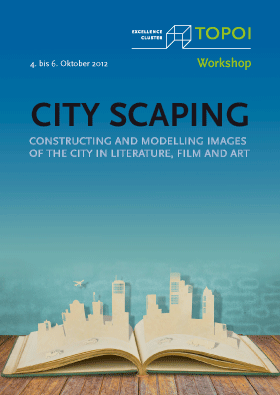Constructing and Modelling Images of the City in Literature, Film and Art
The term “cityscaping’ refers to the process through which an image of the city or an urban landscape is designed, and so created as an experience, in the medium of text, film and fine arts or graphic art. The conference will ask which literary, visual and acoustic means are deployed to engage the reader or viewer in the process of imagining urban terrain, and what semantic and functional values are assigned to the image of the city constructed by these media. That is, what selections and reductions are made and which specific features are used in the different media to construct a mental picture of the city? The focus is on cities of the ancient world as pictured in literature. Other media and other cities, including modern ones, will also be brought into the debate, to discuss the technical and artistic means available, as well as the techniques by which a semantics of city-images is created and their constitutive elements for every city.
Konstruktionen und Modellierungen von Stadtbildern in Literatur, Film und bildendender Kunst
Mit dem Begriff des “Cityscaping” wird der Prozess umschrieben, in dem ein Stadtbild oder eine Stadtlandschaft in den Medien Text, Film und Artefakten entworfen und erfahrbar gemacht wird. Im Zentrum der Tagung soll einerseits die Frage stehen, mit welchen literarischen, visuellen und akustischen Mitteln Leser/innen bzw. Zuschauer/innen zum Prozess der räumlichen Imagination aufgerufen werden, und andererseits welche Semantik und Funktionen einem medial konstruierten Stadtbild zugeschrieben, d.h. welche Selektionen/Reduktionen und welche spezifischen Requisiten in den unterschiedlichen Medien eingesetzt werden. Im Zentrum stehen die Entwürfe antiker Städte in der Literatur; durch den Einbezug weiterer Medien und moderner Städte soll die Frage nach den technischen und künstlerischen Möglichkeiten sowie den Techniken der Semantisierungvon Stadtbildern und ihrer für jede Stadt konstitutiven Elemente diskutiert werden.
4.10.2012 | |
18:00 - 20:00 | The city of Rome as citation or recitation of other cities Alessandro Barchiesi |
5.10.2012 | |
09:15 - 09:45 | "In jeder Stadt steckt ein großer Roman’: Erzählte Städte in der antiken Literatur Therese Fuhrer |
09:45 - 10:15 | Sinnliche Städte. Wie spätantike Christen den urbanen Raum erfahren Jan Stenger |
10:15 - 10:45 | Diskussion |
11:15 - 11:45 | Vergilian visions of Rome. Origins, histories and empire Damien Nelis |
11:45 - 12:15 | Cityscaping in Propertius and the Elegists Alison Keith |
12:15 - 12:45 | Diskussion |
14:00 - 14:30 | Domitien triomphant, jalons littéraires à travers la ville, de la Porta triumphalis au Palatin : définition symbolique d’un nouveau centre de Rome Manuel Royo |
14:30 - 15:00 | Die Imagination der Stadt Rom bei Claudian: Weibliche Allegorie und Herrscherlob Lydia Krollpfeiffer (geb. Tummuseit) |
15:00 - 15:30 | Diskussion |
16:00 - 16:30 | Edward Gibbon and the city of Rome Catharine Edwards |
16:30 - 17:00 | Karthago – rich & sophisticated. Form und Funktion des Cityscaping in Heinrichs von Veldeke ,Eneasroman Maximilian Johannes Benz |
17:00 - 17:30 | Diskussion |
18:00 - 20:00 | Das Projekt "First we take Berlin" Jürgen Kneiper Peter Paul Kubitz |
6.10.2012 | |
09:15 - 09:45 | Der doppelte Beginn von Alfred Döblins ,Berlin Alexanderplatz". Experimente mit der erzählten Wahrnehmung einer Großstadt Katrin Dennerlein |
09:45 - 10:15 | Spiel mit der Tradition und Darstellung der Gegenwart in Le città invisibili von Italo Calvino Christian Rivoletti |
10:15 - 10:45 | Diskussion |
11:15 - 11:45 | Städtische Ikonographien, narrative Räume und moderne Geschichtsbilder in ,Gladiator" und ,Rome" Margrit Tröhler |
11:45 - 12:15 | ‚The Wire" Julika Griem |
12:15 - 12:45 | Diskussion |
14:00 - 14:45 | Stadtentwürfe im Spiel Andreas Tönnesmann |
14:45 - 15:15 | Diskussion |
15:45 - 16:15 | Raumwahrnehmung und Antikebezug in der lateinischen Literatur der Renaissance: Flavio Biondo und Cristoforo Landino Gernot Müller |
16:15 - 16:45 | Humanistische Städtebeschreibungen und die antike Theorie der Ekphrasis Felix Mundt |
16:45 - 17:15 | Diskussion |

